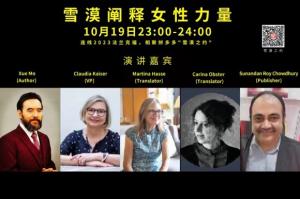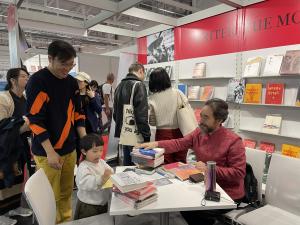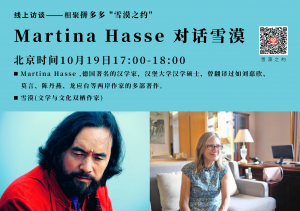German edition of “Desert Hunters” successfully launched at the Frankfurt Book Fair
— Xue Mo
AURORA, IL, USA, October 22, 2023 /EINPresswire.com/ — The global publishing industry is thriving, with literary works emerging in every language. Yet, our world continues to be plagued by wars, pandemics, and various disasters. This disparity prompts one to reflect—what true significance and impact do literature, culture, and the publishing industry hold for the human existence? With this very contemplation, renowned author Xue Mo embarked on another European tour, showcasing his classic works at the 75th Frankfurt Book Fair, including “Desert Rites,” “Into the Desert,” and “Desert Hunters”
On the afternoon of October 19 (Berlin time), the launch ceremony of the German edition of “Desert Hunters” was held successfully in the International Hall of the 2023 Frankfurt Book Fair. At the event, writer Xue Mo engaged in a thought-provoking conversation with Claudia Kaiser, the Vice President of Business Development for Asia, Africa, and Arab countries at the Frankfurt Book Fair; Martina Hasse, a German sinologist; Crina Obster, the German translator of the book “Selected Stories by Xue Mo,” and Dr. Sunandan Roy Chowdhury, the Editor-in-Chief of “Eastern Review” Magazine and founder of SAMPARK Publishing house. They deeply delved into topics such as the core values of literature, the awakening of women, and the power of motherhood.
During the discussion, Claudia expressed keen interest in the desert imagery in Xue Mo’s works and its potential connection to femininity. To this, Xue Mo clarified, “In my novels, the desert is symbolic, a metaphor. When people become indifferent and devoid of love, our environment becomes more barren than a desert.” Addressing human crises like wars, epidemics, and natural disasters, he emphasized that the ultimate answer lies within the mindset of each individual. “In the face of adversity, salvation is within us, not in some mythological savior or monarch.”
Xue Mo firmly believes that the essence value of literature isn’t in the fleeting fame or material benefits sought by authors but in providing a sanctuary for truth, goodness, and beauty for the souls of its readers. He further stated, “Although today’s literary world seems prosperous, profound works are very rare. The various forms of literature remain, but its deeper spirit is fading. We must search for and reclaim the lost spirit of literature and the forgotten essence of culture.”
When asked if his stories were inspired by real life, Xue Mo candidly admitted that many characters and plots in his writings were drawn from actual events, with some rich details being direct experiences of his own. “What they’ve gone through, I’ve experienced myself; what they’ve faced, I’ve confronted myself; what they’ve overcome, I too have conquered.”
Xue Mo revealed that his writing experience did not originate from traditional academic training but was driven by his long-standing dream of literature. He aspired to capture the last glimpses of agricultural civilization in western regions with his own pen. This unique perspective injected “Desert Rites” with an unique charm. Once, Xue Mo shared his real thoughts in a live stream, “No other author would write “Desert Rites” the way I did because many deem such an approach unconventional and inappropriate. But I heed only my inner voice, authentically portraying the everyday lives and emotional states of western farmers. The purpose of literature determines its form, and my literary pursuit shapes my creative style. Hence, my works always exude a lasting spiritual power.”
So, how does literature generate spiritual power? In his conversation with the acclaimed German sinologist, Martina, Xue Mo summarized his “non-academic” literary cultivation into five stages: Concentration Training, Transcending the Self, Unity of Heaven and Man, Practicing Love and Compassion, and Wisdom Upgrade.
“Firstly, Concentration Training. Stay focused and become the master of the mind, unaffected and unswayed by the external world or its various temptations. As the training progresses, your mind becomes steadier and steadier, until no longer swaying like the grass atop a wall, or moving with every gust of wind. Secondly, Transcending the Self involves breaking worldly attachments, eliminating binary oppositions, and overcoming one’s biases, suffering, worries, and anxieties, shattering the petty “self” or “ego” to achieve selflessness. Thirdly, Unity of Heaven and Man means merging one with Nature, understanding that heaven, earth, and oneself share the same roots, reaching the realm described by Zhuangzi in his “Equalizing the Myriad Things.” Fourth, Practicing Love and Compassion refers to unconditionally loving all sentient beings, as naturally as a mother loves her child, and a child instinctively loves his mother, at which point immense inner strength arises. The last but not the least, Wisdom Upgrade. It includes leveled training in the understanding of both the mundane and the ultimate truth, thereby enhancing one’s cognition and aesthetic appreciation of the whole universe.”
Xue Mo stressed that only after completing these five stages of spiritual training, and genuinely tapping into the profound capabilities of a true mind, can love and wisdom flow naturally from one’s soul. At that time, the soul can provide whatever the world needs. Works like “Desert Rites,” “White Tiger Pass,” “Curse of Xixia,” “Sosalang,” “Laozi’s True thoughts,” and “Buddha’s Wisdom” are manifestations of Xue Mo’s primordial wisdom and state of being.
Additionally, Carina, the German translator of “Selected Stories by Xue Mo,” shared her insights from her translation process. Analyzing the story titled “The Women, the Camels and the Dholes,” Carina focused on the spiritual transformations of the two main female characters, Ying’er and Lanlan. Bound for a long time by poverty and the bride-exchange custom, their marriages and fates took tumultuous turns. Yet, both displayed defiance against destiny. In the desert, facing numerous challenges, both heroines braved dangers and successfully escaped, exemplifying the resilience and independent spirit of women.
In the story, Lanlan is pragmatic, deeply aware of her societal status and hopes to change her dire situation through her own efforts. In the beginning, Ying’er appears dependent, but as the story unfolds, she demonstrates a burgeoning independent personality. Carina especially noted that the male camel in the story symbolizes traditional male stereotypes, creating an interesting role reversal.
As the discussion neared its conclusion, a female professor in attendance expressed slight confusion over Xue Mo’s Mandarin with a slight western accent, mistakenly thinking Chinese wasn’t his mother tongue. To this question, Xue Mo responded in humor, “My mother tongue is the language of the soul. I’ve always communicated with the world from the heart, and Mandarin is merely one mode of my expression. Singing, painting, and calligraphy are translations of my soul’s language. I am able to empathize with everyone’s pain, be it historical figures or present-day individuals, Israelis or Palestinians. I always feel the pain of others’ tragedies, which resonate deeply within me. Therefore, I aim to voice this love with my pen, hoping to bring a touch of warmth and kindness to this world.”
In today’s increasingly indifferent world, rife with conflict and ravaged by pandemics, our literature should return to its spirit-centered tradition, nourishing and even transforming the souls of all humanity, offering the society solace, tolerance, tranquility, and boundless love.
Ida
Ruxue International Media Inc
+1 773-648-5522
email us here
Visit us on social media:
Facebook
Twitter
YouTube
![]()
Article originally published on www.einpresswire.com as Bringing Literature Back to Its Spirit-Centered Tradition








